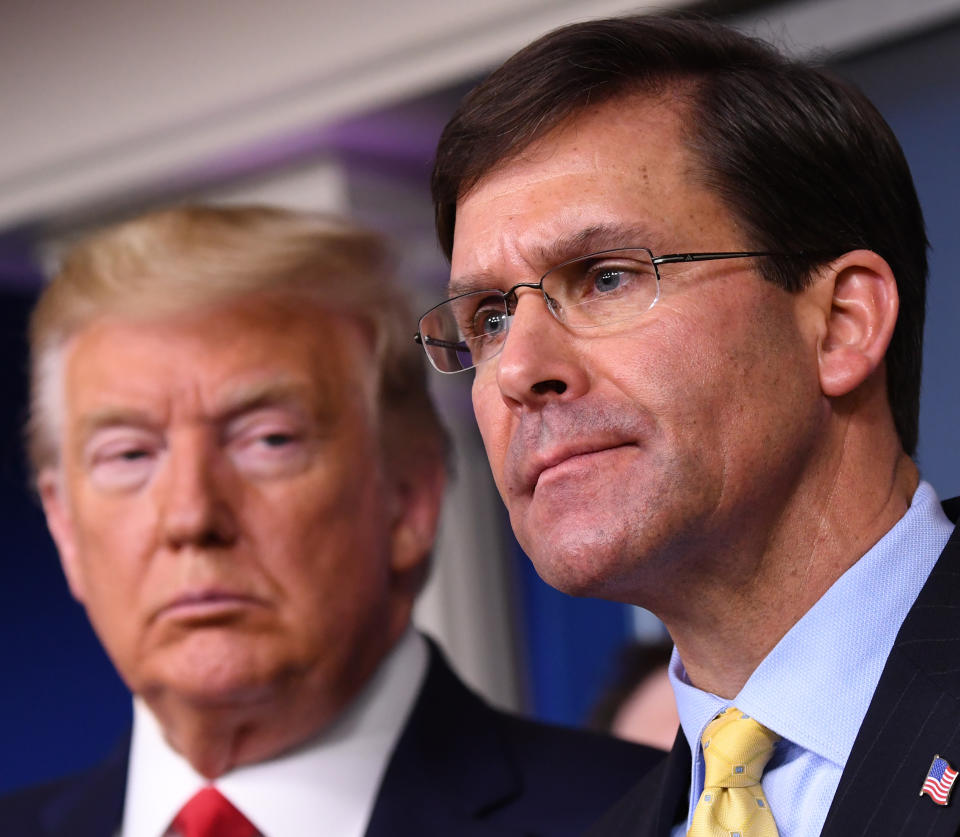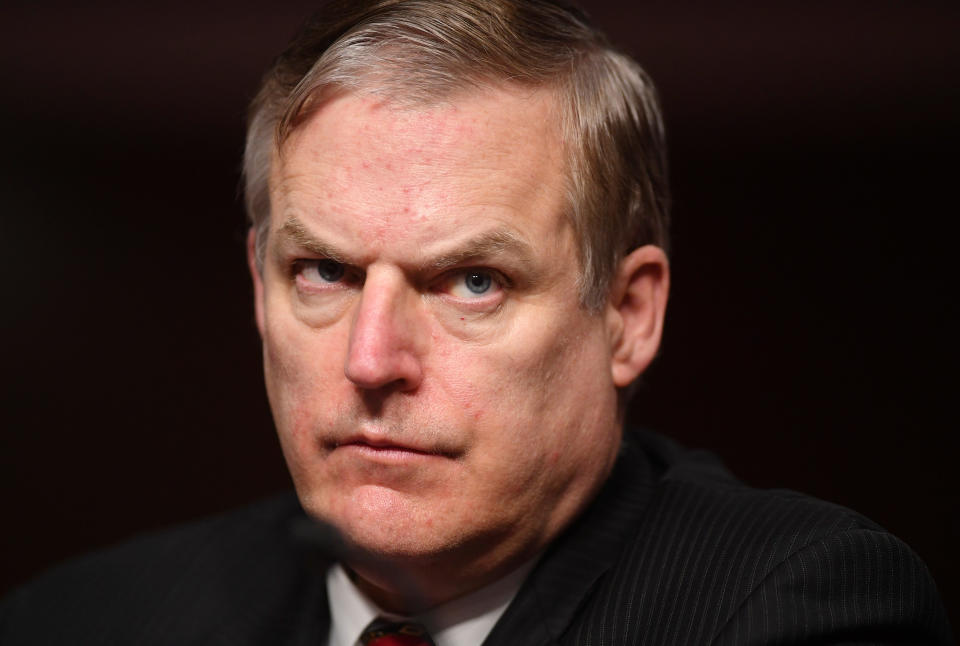'The long knives are out': The Pentagon purge may be less about a Trump plan than end-of-presidency chaos and revenge
A series of abrupt personnel changes placing Trump loyalists in key positions in the Defense Department has sparked rumors of plans for dramatic action in the waning days of his presidency, but a number of former national security officials see it more as the chaotic final days of an outgoing administration.
Trump “terminated” Defense Secretary Mark Esper with a tweet Monday, shifting the head of the National Counterterrorism Center, retired Army Special Forces Col. Chris Miller, to fill the top Pentagon job on an acting basis. Three other Pentagon officials resigned the next day. Their replacements have raised eyebrows for, in some cases, their lack of experience and, in other cases, their incendiary political views.
But Deborah Lee James, who served as secretary of the Air Force during the Obama administration, attributed the changes less to any nefarious plan on Trump’s part than to the president’s desire for revenge against individuals he thinks have slow-rolled the implementation of his policies. “The long knives are out, and he’s a big score settler,” she said.
Those resigning included the holders of two of the most senior positions in the department. Retired Vice Adm. Joseph Kernan resigned as undersecretary of defense for intelligence and security, while James Anderson left his position as acting undersecretary of defense for policy.
In Kernan’s place as acting undersecretary Trump named Ezra Cohen-Watnick, a controversial former Defense Intelligence Agency official close to retired Army Lt. Gen. Michael Flynn, Trump’s first national security adviser. Flynn brought Cohen-Watnick onto the National Security Council staff in early 2017, but when retired Army Lt. Gen. H.R. McMaster replaced Flynn, he fired Cohen-Watnick.
To replace Anderson, Miller named another controversial figure, retired Army Brig. Gen. Anthony Tata, who had been performing the duties of the deputy undersecretary for policy. Because he has not been confirmed by the Senate for any position, he is now officially “performing the duties” of the undersecretary for policy. In tweets that he has since deleted and for which he has expressed regret, Tata has made Islamophobic statements and referred to former President Barack Obama as a “terrorist.”
Esper’s chief of staff, Jen Stewart, who had previously worked for a series of top Republican congressmen, also resigned Tuesday. In her place, Miller named as his acting chief of staff Kash Patel, a National Security Council staffer with a reputation for spreading conspiracy theories and “deep state” rhetoric. Patel was responsible for penning a controversial memo that accused federal officials of bias against Trump in their investigations of links between Russia and his presidential campaign.

Patel also used to work for Rep. Devin Nunes, R-Calif., the former chair of the House Intelligence Committee, as did Michael Ellis, another Trump loyalist who this week moved from the White House to be installed as the new general counsel of the National Security Agency — a position that had been empty since February. Ellis and Cohen-Watnick were reportedly the White House figures who provided Nunes with intelligence reports showing that Trump’s 2016 presidential campaign was caught on interceptions by U.S. intelligence agencies that were surveilling foreign officials with whom the campaign was in touch.
In addition to these staff changes, the Pentagon announced that retired Army Col. Douglas Macgregor, who has argued for a quick U.S. military withdrawal from Afghanistan, would join Miller’s team as a senior adviser. During the 1990s Macgregor gained a reputation within Army officer circles as an iconoclast, albeit one with a short temper.
In recent years he has reinvented himself as a Trump-supporting talking head on Fox News. This summer Trump nominated him as ambassador to Germany, a choice that was roundly criticized after a series of Islamophobic and racist statements by Macgregor came to light.
“Mr. Macgregor’s decades of military experience will be used to assist in the continued implementation of the president’s national security priorities,” said a Defense Department spokesperson in an email.
Taken together, the changes at the top of the Defense Department have given rise to speculation that Trump is making them to serve a hitherto hidden agenda. Richard Haass, the longtime president of the Council on Foreign Relations who has served in multiple Republican administrations, crammed many of the fears expressed by others into a single tweet Thursday.
Haass suggested that Trump might have undertaken his “Pentagon purge” to emplace people who would “carry out irresponsible withdrawals” of U.S. forces from Afghanistan, Germany or South Korea, or conduct a “risky operation” against Iran, or “do something” for Russia or Turkey. Haass’s final theory was that Trump might want loyalists in place to enforce orders for U.S. troops “to take on [a] domestic security role.”

These concerns are widespread in the national security community. “There is definitely something brewing … repugnant enough that they need as many fringe ideologues as they can get,” said a congressional staffer, adding that intelligence insiders “suspect this is all for action against Iran.”
The fear, the staffer said, was that the Trump administration would cite “an unspecified threat to U.S. personnel or facilities” as a pretext to launch an attack on Iran “regardless of the merits of the intel.”
Rep. Adam Smith, a Washington Democrat who chairs the House Armed Services Committee, also sounded the alarm. “If this is the beginning of a trend — the president either firing or forcing out national security professionals in order to replace them with people perceived as more loyal to him — then the next 70 days will be precarious at best and downright dangerous at worst,” he said in a statement released Wednesday.
But Republican observers discounted the speculation.
Those looking for a secret agenda behind the personnel changes “are reading far more into it” than what exists, said a former Republican Pentagon official. “There is nothing here.”
A former Trump administration security official was similarly dismissive. The ouster of Esper, whose public opposition to the use of active-duty troops to quell racial justice protests had angered Trump, had been coming “for a long time” and acted as a catalyst for the other departures, that former official said. “Other people just resigned because of that.”
“Joe Kernan was ready to retire” and had been planning to do so “for a while,” the former Republican Pentagon official said. Similarly, Ellis’s move to the NSA had been in the works for about five months, the former Trump administration security official said.

Anderson, a former Marine intelligence officer who served in a number of Defense Department positions throughout the George W. Bush presidency and then held a series of jobs at military academic institutions, left because he was “fed up with the BS,” the former Republican Pentagon official said.
The theory that Trump made the personnel changes in order to smooth bureaucratic resistance to some form of action against Iran before the change in administration amounted to “hogwash,” the former Trump security official said.
With the exception of Esper, the officials who resigned did so voluntarily out of “pure self-interest” in order to burnish their public image by putting some distance between themselves and the president, according to the former Trump administration security official. “They’re trying to salvage some credibility for themselves,” the former official said. “Better to go out now, because they’re going to go out in two months anyway.”
The Defense Department did not respond to emailed questions about whether Kernan, Stewart and Anderson resigned voluntarily or were forced to leave.
Even if there’s no grand design behind Trump’s game of musical chairs, some observers worried about what the new faces in the Pentagon might get up to. “Having Cohen-Watnick and Patel move up is worrisome,” said Doug London, a retired senior CIA operations officer.
The pair see the Pentagon and the intelligence community “as mere tools to support the president’s personal agenda, without accountability to national priorities or otherwise subordinate to lawful operational standards,” London said. “They can do a lot of harm in a week with that sort of power.”

Trump’s installation of individuals perceived as loyalists comes amid growing concern over the potential damage to national security that he is doing by refusing both to acknowledge former Vice President Joe Biden’s clear victory in the presidential election and to take the steps required to allow the Biden transition team to fully prepare for the challenges of running the government.
In particular, Trump has refused to direct Emily Murphy, the head of the General Services Administration, to release the funds and permit the access due to the transition team of the winner of a presidential election. On Thursday a letter to Murphy signed by more than 150 national security experts, urging her to sign the necessary paperwork, was released.
“Delaying the transition further poses a serious risk to our national security,” said the letter, which was first reported by Politico and whose signatories included alumni of both Democratic and Republican administrations, including the Trump administration. The letter noted that, according to the 9/11 Commission Report, the 36-day delay in the transition after the contested 2000 election led to a six-month delay in the George W. Bush administration filling national security positions, “which left our country more vulnerable to foreign adversaries.”
In prior transitions, the incoming administration installed what is normally called a “landing team” but that the Biden campaign is calling an “agency review team” in office space that the Pentagon made available. Each office in the department prepared briefing books for the team on everything that a new administration might need to know ahead of taking charge.

“We did a lot of work to prepare them,” recalled Andrew Exum, the outgoing Obama administration deputy assistant secretary of defense for Middle East policy, describing the weeks leading up to the Trump administration taking over. “We built a lot of binders on every relevant issue, every relevant country, the counter-Islamic State campaign being a particular focus, and we had that ready to go.”
In response to a question about whether the Pentagon had prepared briefing materials and set aside office space for the incoming Biden teams, a Defense official said in an email that those actions had not been taken, because Murphy, the GSA head, had not formally recognized Biden as the winner of the election.
“That has not occurred and is not a [Department of Defense] responsibility,” the Defense official wrote. “Once it does occur, and should there be a President-Elect, federal resources will become available to the President-Elect Transition Team by statute.”
Exum was skeptical that the delays in transition had so far created a national security crisis, because the Pentagon has an advantage in that the officer corps does not switch out with the administrations. A temporary “shift in the balance of power” away from the civilian leadership and toward the military, and the Joint Staff in particular, is normal during a presidential transition, he said.
James, who was the outgoing Air Force secretary during the transition to the Trump administration, agreed, but with the proviso that civilian control of the military is “a bedrock principle of the Constitution” and that any diversion from that would not be “a positive precedent.”
She said that what she was hearing from her peers in the national security arena regarding Trump’s delaying tactics was not “alarm, per se,” but “aggravation,” with many asking the question: “How is this going to end?”
_____
Read more from Yahoo News:

